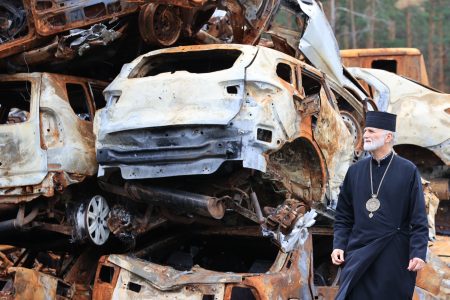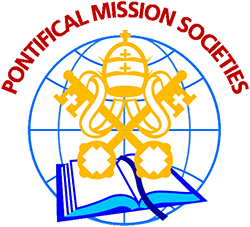Society Of St. Peter: Ukraine and the Resilience of David Against Goliath

“I think it’s a miracle, David standing up to Goliath. It is not natural, it is supernatural,” said Archbishop Borys Gudziak, Metropolitan-Archbishop of the Ukrainian Catholic Archeparchy of Philadelphia when speaking about what he has seen during his six visits to Ukraine following Russia’s February 2022 invasion.
In an exclusive interview with MISSION Magazine, Archbishop Gudziak shed light on the dire situation in Ukraine and the vital role of the Ukrainian Greek Catholic Church (UGCC) in providing support and hope to those affected by the conflict.
“Every visit is tougher than the previous one, but at the same time, it isn’t,” he said. “The way the people are resilient, there is a lot of humor, there are songs, there are memes, it is awe-inspiring.”
“Obviously, there is incredible exhaustion and the suffering is cringe-worthy,” Archbishop Gudziak said. “But people understand very clearly that if Russia is allowed to occupy Ukraine, there will be genocide, in addition to the ongoing ecocide. And there have been genocidal manifestations and crimes against humanity in the past 18 months.”
He has visited Butcha, a city near Kiev, the country’s capital, occupied by Russia between March 4 and 31, 2022, and what he has seen there “is devastating,” as is the witness of the first respondents he spoke to, those who first found the mass graves for the 1,400 people tortured and killed in a span of a month.
“It is devastating,” he insisted. But “there is this other side of the coin, incredible valor, which makes you straighten up because how can we falter when those living in Ukraine today are standing tall?”
Since the war started, the UGCC has been at the forefront of humanitarian relief efforts. Archbishop Gudziak’s Archeparchy, for instance, raised nine million dollars to support various projects aimed at assisting those in need. From providing medical supplies like bandages and tourniquets to offering aid to the six million internally displaced persons (IDPs) and eight million refugees, the Church has been a beacon of hope for the vulnerable.
The UGCC is not foreign to persecution and martyrdom. On the contrary. As Archbishop Gudziak pointed out, every time Russia has occupied Ukraine, beginning with the 18th century, his Church, the largest of the Eastern Rite churches in communion with Rome, has been banned. In the Soviet era, the UGCC was the largest illegal religious body in the world and suffered mightily for it.
When the Soviet Union dissolved and Ukraine regained its independence, the Church experienced a rebirth: After driving 3.5 million faithful underground and confiscating almost all of its property, a post-Soviet Ukraine allowed the UGCC to reemerge. From that point, it rose from the catacombs with miraculous growth: Over 3,000 priests died in the gulags, and by the time Ukraine regained its independence, only 300 were left, and not all of them in Ukraine. Today, this Church claims more than seven million faithful and 3,000 priests, with 100 being ordained each year and more than 800 seminarians.
Archbishop Gudziak highlighted the challenges faced by the Church in occupied territories today, where Russian forces once again seek to abolish the UGCC. Arrests, torture, and disappearances of priests have been reported, highlighting the ongoing persecution. The contrast with the Russian Orthodox Church is striking, as the archbishop points out that not a single Orthodox bishop has spoken against the war, and less than one percent of the clergy has voiced opposition.
The legendary Ukrainian Cardinal Josef Slipyi, who spent two decades in the gulags, once said that his Church had been buried under “mountains of corpses and rivers of blood.” During his 2001 visit to Ukraine, John Paul II beatified 27 Greek Catholic martyrs under the Soviets — one of whom had been boiled alive, another crucified in prison, and a third bricked into a wall.
Yet despite this persecution, or perhaps because of its resilience in the face of oppression, the UGCC has long been among the most important pro-democracy forces in Ukraine. And this, Archbishop Gudziak believes, is directly tied to Cardinal Slipyi and his articulation of Catholic Social Doctrine, which he summarizes as “God-given human dignity, solidarity, subsidiarity, and the common human good.”
“The Church in Ukraine went underground during WWII having lived under his leadership, and we remained underground for two generations,” said Archbishop Gudziak. “When we were finally free to come out from the catacombs, with our hands clean for not having collaborated in any way with Russia, the UGCC became a strong moral voice. And we have remained such for the past 35 years.”
Referring once again to the resilience of the Ukrainian people, this Syracuse-born son of Ukrainian immigrants said that it was during a recent visit to New York that it dawned on him the solidarity he had witnessed in his parents’ homeland.
“Seeing a homeless man in New York, I realized that I had encountered none in Ukraine during my visits following the invasion,” Archbishop Gudziak said. “And this is explained by the incredible solidarity we have seen in this country since the invasion began. People have opened to each other, just like Poles have opened up to Ukrainians.”
As the war rages on and the Ukrainian people face unimaginable hardships, may Archbishop Gudziak’s words serve as a call to action. The bravery and resilience of the Ukrainian people, coupled with the unwavering support of the UGCC, its priests, religious and seminarians, highlight the strength of the human spirit in the face of adversity.
“Please, continue praying, continue advocating, explaining what is going on, and continue helping in whatever way you can,” Archbishop Gudziak said, urging the family of The Pontifical Mission Society to continue making a difference and bringing hope to a nation in need.
You can help missionaries in Ukraine through the Missio fund “In Solidarity with Ukraine.”
